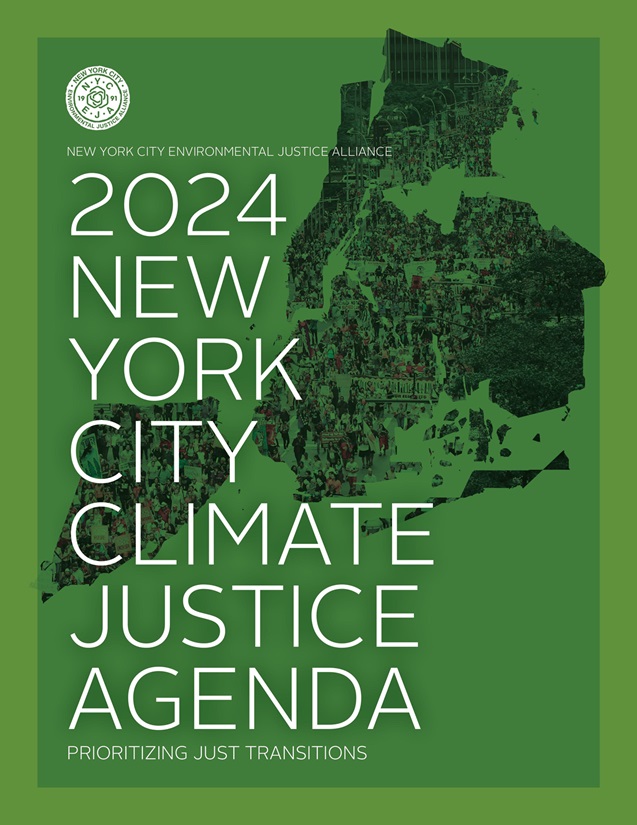NYC’s Low-Income Communities of Color Demand Action at a Time of Growing Concern About Delays, Backsliding by NYC and NYS on Climate Justice Commitments
New York, NY – The 2024 New York City Climate Justice Agenda, a new report from the New York City Environmental Justice Alliance (NYC-EJA), provides community-based guidance on how New York must move forward to address the climate crisis in a meaningful, timely, and equitable manner. It is a solutions-oriented guide for State and City leaders struggling to implement the ambitious climate policies and legislation passed in recent years. Read the report
The 2024 New York City Climate Justice Agenda, the fifth edition of the Alliance’s Climate Justice Agenda, assesses and reviews City and State climate efforts along three central themes:
● Transitioning to Clean Energy and Economic Justice
● Reimagining Our Built Environment and Harmful Land Uses
● Strengthening Community Care and Grassroots Power
Examples of forward-thinking climate solutions from the report include:
● Regulating last-mile e-commerce facilities clustered in low-income communities of color, to reduce air pollution from trucks and negative health outcomes like asthma.
● Prioritizing heat response and planning as these lethal climate threats loom in the near future.
● Transforming and modernizing New York City’s school buildings to be green, resilient, and healthy for students and faculty, as New York gets hotter and wetter
Backsliding commitments
“The State Climate Leadership and Community Protection Act, the City Climate Mobilization Act and other climate-forward policies are a testament to New York’s visionary environmental and climate justice movements,” said Eddie Bautista, Executive Director, NYC Environmental Justice Alliance. “Unfortunately, however, this report documents a stunning lack of vision, coordination and urgency by both the City and State leadership in actually meeting these bold climate policy mandates. New York needs to do better to meet the challenge of the climate crisis, and NYC-EJA’s 2024 NYC Climate Justice Agenda shows the glidepath to actually realizing climate and environmental justice in New York.”
The 2024 New York City Climate Justice Agenda arrives when both NYC and NYS governments are floundering in the work of implementing already adopted legislation and policies commensurate with the climate crisis or when are delaying or backsliding on previous climate justice commitments. Some examples include:
New York State
● The NYS Public Service Commission stated in July 2024 that New York is likely unable to meet the Climate Leadership and Community Protection Act’s 70% renewable energy grid by the 2030 mandate, and that delaying the timeline to 2033 or beyond could be “unavoidable.”
● Power plants scheduled to shut down have had their permits extended.
● Plans for an energy transition blueprint and cap-trade-and-invest program have been delayed.
New York City
● NYC Local Laws 60 and 64 passed in 2017 mandating NYC to identify environmental justice areas,
study environmental burdens and disparities across the city, and develop a plan (the EJNYC Plan) to address these environmental injustices have been delayed for years.
● NYC’s Local Law 97 represents one of the most ambitious municipal climate policies in the nation, aiming to cut building emissions city-wide 40% by 2030. Yet, implementation has been slow and there are growing calls for weakening the legislation.
● The NYC Department of Citywide Administrative Services (DCAS) publicly admitted in December
2023 that the City is not on track to comply with NYC’s climate law by the 2025 deadline.
● Legally mandated climate and environmental initiatives, such as PlaNYC, AdaptNYC, and PowerUp, lack revenue, timetables, and/or milestones. For example, PlaNYC listed the goal of 30% tree canopy city-wide, but failed to provide a target year.
About the New York City Environmental Justice Alliance (NYC-EJA)
Founded in 1991, NYC-EJA is a non-profit, citywide membership network linking grassroots organizations from low-income communities of color in their struggle for environmental justice. We empower our member organizations to advocate for improved environmental conditions and against inequitable burdens through the coordination of campaigns designed to inform City and State policies. Through our efforts, our members coalesce around specific common issues that threaten the ability for low-income communities of color to thrive.
NYC-EJA and six of its member organizations — El Puente, The Point CDC, GOLES, The Brotherhood Sister Sol, Nos Quedamos, and UPROSE—are partners of the NYC Climate Justice Hub.
